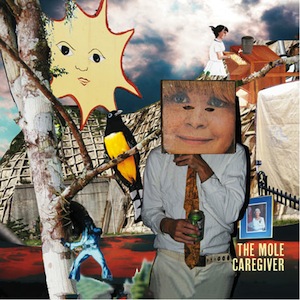The Mole Caregiver
Back with only his second full-length album, despite having a slew of releases on respected […]

Back with only his second full-length album, despite having a slew of releases on respected labels like Wagon Repair, Ostgut Ton, Perlon, and New Kanada, The Mole (a.k.a. Colin de la Plante), has always been adept at honing in on a playful, yet effortlessly cohesive brand of techno. In truth, de la Pante doesn’t usually get as much attention as some of his fellow expat Canadian producers, such as Mathew Jonson, Mike Shannon, Deadbeat, Jeremy P. Caulfield, and Adam Marshall, but that should all change with Caregiver. The full-length is the first LP on Maybe Tomorrow, his new label with Kompakt’s Jon Berry, and it finds the young imprint coming strong out of the gate.
Currently based in Berlin, the Canadian-born producer marries influences that range from Montreal’s burgeoning techno scene of the 2000s to the endless late nights of his present hometown, with a few stops along the way. Built around a plucky bassline that unwinds into The Mole’s quirky sound design, “A Daily Affair” is stirring start to his sophomore album, suggesting that simplicity will be a deceptive tool used throughout Caregiver. In a similar vein, “Jamais Que Toi” rolls out with deeply embedded, tripped-out vocals that emerge out of the shadows and demonstrate how techno often thrives on almost indecipherable samples and otherworldly sounds. De la Plante shifts gears with “Slow Blame,” a hazy sidestep that rides a sullen melody and an uninspired 303. It’s a slight misfire, albeit not one that derails the album’s nuanced cocktail of hand-strung melodies, precise percussion, and muted basslines.
“The Time Has Come” has just the right amount of freakiness and relies on both a sense of nostalgia and familiarity to draw the listener in. “Interlude to Love” is a short, frisky blast, while “Carry On (We Must),” a song anchored by the building blocks of vintage house grooves, is a laid-back charmer whose slinky melody, timeless chorus, and carefree feeling offer some of the album’s best moments. Ratcheting up de la Plante’s quiet confidence, “(When) Monkey Punches Dog” works over a relentless afterhours techno vibe, employing sinful synths that lie somewhere between Canada’s West Coast, Montreal, and Berlin.

